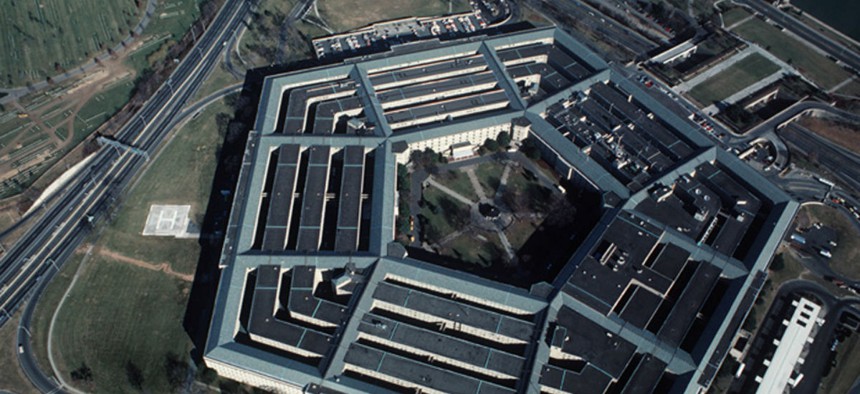
Defense Department file photo
Two Admirals Cleared of Charges of Illegal Lobbying
Pentagon watchdog says public presentations did not violate law.
A Navy admiral and rear admiral accused of public comments that violated the 1919 Anti-Lobbying Act were within the law when they encouraged symposium audience members to contact Congress, a watchdog found.
Adm. John Richardson, director of the Naval Nuclear Propulsion Program, and Rear Adm. Joseph Tofalo, director of the Navy’s Undersea Warfare operations, were not found to have “spent taxpayer funds on publicity or propaganda to engage in grass-roots lobbying” at a two-day event in 2014, according to the Defense Department inspector general’s office. The watchdog’s report was dated July 21 but released Thursday under the Freedom of Information Act.
The two had been accused of illegal lobbying in June letters from the comptroller general, the chairman and ranking member of the Senate Armed Services Committee, and the nonprofit Project on Government Oversight. The admirals spoke separately on Oct. 22 and Oct. 23, 2014, at the Naval Submarine League Annual Symposium in Arlington, Va.
Their presentations included one or two sentences that encouraged attendees to inform Congress and others on the importance of the Ohio submarine replacement program and overall Navy undersea future requirements, the report said.
The Anti-Lobbying Act prohibits congressionally appropriated funds to be used directly or indirectly to pay for any personal service, advertisement, telegram, telephone, letter, printed or written matter, or other device, intended or designed to influence in any manner a member of Congress to favor, adopt or oppose any legislation, the IG noted.
“We determined, based on the Department of Justice Office of Legal Counsel's interpretation of the Anti-Lobbying Act, that the admiral's brief speeches and RADM Tofalo's limited distribution of the Integrated Undersea Future Strategy for Industry to authorized recipients did not violate the Anti-Lobbying Act,” Deputy IG Marguerite Garrison wrote. “Similarly, their actions did not violate the other standards,” such as the Anti-Deficiency Act.
Investigators found that Richardson asked the attendees to "aggressively look to get on people's calendars to inform those in your sphere of influence, the entire sphere, everybody from Congress to your PTA [Parent Teacher Association]" about the importance of the program for the country.” Tofalo paraphrased Richardson’s exhortation the following day.
Richardson did not distribute any accompanying documents, the probe determined. Tofalo's staff distributed a five-page document, "Integrated Undersea Future Strategy for Industry," to about 30 members of industry at the symposium who were authorized to receive it. The document did not contain the words “Congress” or “Congresssman,” nor did it call for any contact with members of Congress.
But Tofalo’s talk included a suggestion for the audience to be “calling on your own Congressman," and an offer to provide "trifolds, priorities briefs, talking points for your Congressman, whatever, we are more than happy to support you on that, as I would support any American who - who would ask."







